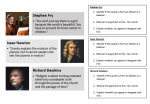With the publication of the CORE report into religious education and the new Ofsted framework it seems to be a time when many schools are looking to refresh or reorganise their curricula. I joined my current school last September and arrived at the tail end of a multi-year process to do this, introducing a rigorous and broad KS3 curriculum covering topics from the Holocaust to Buddhism to an introduction to philosophical ideas.
We are very fortunate to work collaboratively meaning that each SoW is planned by a member of staff and shared with the entire department. This helps us be consistent across teaching, enforces our collaborative culture and reduces workload. I ‘pitched’ the idea of a scheme-of-work explicitly looking at non-religious worldviews in Year 7 as this was something I had written about on my PGCE. What you can see below is exactly that, designed to be high challenge for Year 7 and incorporating, hopefully, a knowledge-rich approach.
Lesson 1 – Atheism, Agnosticism and Humanism
This lesson introduces students to the key terminology behind NRWVs and gives them a brief explainer of three arguments in favour of, and three arguments against, the existence of God. These reoccur in the AQA GCSE Existence of God and Revelation module so I felt it was good to embed them early on even if the concepts are only touched on briefly. The worksheet introduces three quotes from Stephen Fry, Richard Dawkins and Isaac Newton.
Lesson 2 – Finding Happiness
Students move into a philosophical bent here exploring the idea of the ‘good life’ and finding purpose without God. It begins with a brief explanation of Humanist beliefs followed by an introduction to the concepts of eudaimonia and hedonism. Students then use these concepts to do a piece of extended writing. There is a quote sheet included so students have reference to the quotes in their notes.
Lesson 3 – Death and Humanist Funerals
This lesson asks students how Humanist beliefs about God and the purpose of life link in to their beliefs on death and Humanist funeral services. There is an opportunity for guided discussion on this as well as a reading and summarising task of a Telegraph article about Humanist funeral services.
Lesson 4 – Atheism in Britain
This is quite a numeracy-heavy lesson focusing on the current state of religion and non-religion in the UK. It features the comparison of data, interpreting infographics and making conclusions from news articles. After this students write a short report on the question of whether Britain has demographically become an atheist country.
Lesson 5 – Grayson Perry: Secular Art
This lesson looks at the ongoing place of religious imagery even within the secular art of someone like Grayson Perry. It then goes on to look at how Perry uses symbols, imagery and text to capture different identities focusing on vases he made for the Remain and Leave campaigns. The final task is getting students to design their own identity vase, you could ask older students to do something a bit more in-depth but given that this lesson will fall on the last week of term for us it seemed like a good activity.
Knowledge Organiser, Key Word Quiz and Assessment
I have included a dual-coded knowledge organiser with full details of the key words and key ideas covered in the topic. I have also included an A5 key word test to be used either in the last lesson or in the next term to embed recall. I have not included an assessment as I am sure each school has their own requirements in that department. We will likely assess with a few written questions on the topics covered.
This whole scheme of work is far from perfect and a work-in-progress. I am an early-career teacher and still getting to grips with how to pitch things, how to incorporate knowledge and challenge, and how to assess students. I would love to hear how you get on if you adapt and use this for your own lessons.
Download: KS3 Non-Religious Worldviews SoW
If you do share it I ask you share a link to my blog and not just the zip file.
Resources I used
Cambridgeshire Agreed Syllabus – Cambridgeshire Standing Advisory Council on Religious Education
Understanding Humanism – British Humanist Association
Examining Religion and Belief: Atheists – NATRE

















This unit is amazing. Such high quality and interesting subject material.
LikeLike